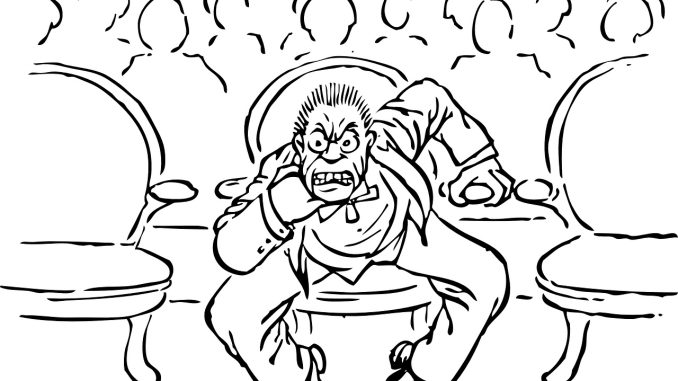
Is Etiquette The Foundation Of Civilization?
How important is Etiquette? It has been said that Etiquette is the foundation of civilization.
The U.S. Congress operates under etiquette via a form of Robert’s Rules of Order.
Of course, Hank Williams Jr.’s law of “We say Sir and we say Ma’am” will echo for eternity for all decent folk. Like holding doors open for people and saying “Thank you” when someone does a courtesy.
Society in the U.S.A. has no uniform set of Etiquette rules; but there are some like Miss Manners, Emily Post, and other sources that make offerings.
Here things start to get sticky. If I ever get into a position where I have to worry about what fork to use in company I will know I have risen beyond my station; I am a one fork man.
Further, Etiquette says you have to refer to another person by the highest office or position they have obtained. My hackles start to rise at this proposition. A person is a President, Senator, Congressperson, Judge, or General and hold those positions for the term specified; but I really don’t think you get to take any of that with you; those things belong to “We the People”. Come in, do a good job, and pass the baton smoothly and with dignity…and God Bless America and its Republic.
There is an example of Etiquette that has been shelved which had a major impact on early America; that is the Code Duello (Code of Dueling). There was a time people were held accountable for their actions and accusations; and there was a buffer zone when the “Seconds” had to agree the offense was seriousness enough that “satisfaction” had to be obtained. But the Etiquette of dueling became top heavy, to where replacements could be inserted to engage in the actual duel, the situation for the Etiquette of dueling became so diluted that the duel could take place between two replacements and the people who the duel was supposed to be over would be sitting at home. That along with using duels as assassinations or career advancements led to duels being outlawed. There was a time where a good tight Etiquette ruled over this deadly accountability.
Now for a treat. I am a computer programmer; I wrote a computer program that will open up at selected intervals a regular Notepad file (.txt, ASCII), and randomly pick a line from that file, and display it in a box along the top of my computer screen for 30 seconds. I can dismiss the box/banner with a wave of the mouse or hitting the [space bar]. I use this program to teach myself all sorts of things based on the premise you have to read something 4 or 5 times before you understand it.
For the past nine months I have been using in my program an Etiquette list George Washington used as his own Etiquette guide based on a set of rules composed by French Jesuits in 1595; it is called “110 Rules of Civility & Decent Behavior in Company and Conversation”. Here is a abbreviated list of these worthy Etiquette guides; the last one has to be the best.
- 1st: Every Action done in Company, ought to be with Some Sign of Respect, to those that are Present.
- 2nd: When in Company, put not your Hands to any Part of the Body, not usually Discovered.
- 3rd: Show Nothing to your Friend that may affright him.
- 7th: Put not off your Cloths in the presence of Others, nor go out your Chamber half Dressed.
- 8th: At Play and at Fire its Good manners to Give Place to the last Commer, and affect not to Speak Louder than Ordinary.
- 9th: Spit not in the Fire, nor Stoop low before it neither Put your Hands into the Flames to warm them, nor Set your Feet upon the Fire especially if there be meat before it.
- 12th: Shake not the head, Feet, or Legs roll not the Eyes lift not one eyebrow higher than the other wry not the mouth, and bedew no mans face with your Spittle, by approaching too near him when you Speak.
- 13th: Kill no Vermin as Fleas, lice ticks &c in the Sight of Others, if you See any filth or thick Spittle put your foot Dexterously upon it if it be upon the Cloths of your Companions, Put it off privately, and if it be upon your own Cloths return Thanks to him who puts it off.
- 17th: Be no Flatterer, neither Play with any that delights not to be Play’d Withal.
- 19th: Let your Countenance be pleasant but in Serious Matters Somewhat grave.
- 20th: The Gestures of the Body must be Suited to the discourse you are upon.
- 21st: Reproach none for the Infirmities of Nature, nor Delight to Put them that have in mind thereof.
- 22nd: Show not yourself glad at the Misfortune of another though he were your enemy.
- 23rd: When you see a Crime punished, you may be inwardly Pleased; but always show Pity to the Suffering Offender.
- 24th: Do not laugh too loud or too much at any Public Spectacle.
- 25th: Superfluous Complements and all Affectation of Ceremony are to be avoided, yet where due they are not to be Neglected.
- 35th: Let your Discourse with Men of Business be Short and Comprehensive.
- 37th: In speaking to men of Quality do not lean nor Look them full in the Face, nor approach too near them at lest Keep a full Pace from them.
- 38th: In visiting the Sick, do not Presently play the Physician if you be not Knowing therein.
- 39th: In writing or Speaking, give to every Person his due Title According to his Degree & the Custom of the Place.
- 40th: Strive not with your Superiors in argument, but always Submit your Judgment to others with Modesty.
- 41st: Undertake not to Teach your equal in the art himself Professes; it Savours of arrogance.
- 42nd: Let thy ceremonies in Courtesy be proper to the Dignity of his place with whom thou converses for it is absurd to act the same with a Clown and a Prince.
- 43rd: Do not express Joy before one sick or in pain for that contrary Passion will aggravate his Misery.
- 44th: When a man does all he can though it Succeeds not well blame not him that did it.
- 45th: Being to advise or reprehend any one, consider whether it ought to be in public or in Private; presently, or at Some other time in what terms to do it & in reproving Show no Sign of Cholar but do it with all Sweetness and Mildness.
- 46th: Take all Admonitions thankfully in what Time or Place Soever given but afterwards not being culpable take a Time & Place convenient to let him him know it that gave them.
- 47th: Mock not nor Jest at any thing of Importance break [n]o Jest that are Sharp Biting and if you Deliver any thing witty and Pleasant abstain from Laughing thereat yourself.
- 48th: Wherein you reprove Another be unblameable yourself; for example is more prevalent than Precepts.
- 49th: Use no Reproachful Language against any one neither Curse nor Revile.
- 50th: Be not hasty to believe flying Reports to the Disparagement of any.
- 51st: Wear not your Cloths, foul, ripped or Dusty but See they be Brushed once every day at least and take heed that you approach not to any Uncleaness.
- 54th: Play not the Peacock, looking every where about you, to See if you be well Decked, if your Shoes fit well if your Stockings sit neatly, and Cloths handsomely.
- 56th: Associate yourself with Men of good Quality if you Esteem your own Reputation; for ‘is better to be alone than in bad Company.
- 58th: Let your Conversation be without Malice or Envy, for ‘is a Sign of a Tractable and Commendable Nature: And in all Causes of Passion admit Reason to Govern.
- 59th: Never express anything unbecoming, nor Act against the Rules Moral before your inferiors.
- 60th: Be not immodest in urging your Friends to Discover a Secret.
- 61st: Utter not base and frivolous things amongst grave and Learned Men nor very Difficult Questions or Subjects, among the Ignorant or things hard to be believed, Stuff not your Discourse with Sentences amongst your Betters nor Equals.
- 62nd: Speak not of doleful Things in a Time of Mirth or at the Table; Speak not of Melancholy Things as Death and Wounds, and if others Mention them Change if you can the Discourse tell not your Dreams, but to your intimate Friend.
- 65th: Speak not injurious Words neither in Jest nor Earnest Scoff at none although they give Occasion.
- 67th: Detract not from others neither be excessive in Commanding.
- 68th: Go not thither, where you know not, whether you Shall be Welcome or not. Give not Advice without being Asked & when desired do it briefly.
- 69th: If two contend together take not the part of either unconstrained; and be not obstinate in your own Opinion, in Things indifferent be of the Major Side.
- 70th: Reprehend not the imperfections of others for that belongs to Parents Masters and Superiors.
- 71st: Gaze not on the marks or blemishes of Others and ask not how they came. What you may Speak in Secret to your Friend deliver not before others.
- 74th: When Another Speaks be attentive your Self and disturb not the Audience if any hesitate in his Words help him not nor Prompt him without desired, Interrupt him not, nor Answer him till his Speech be ended.
- 75th: In the midst of Discourse ask not of what one treateth but if you Perceive any Stop because of your coming you may well intreat him gently to Proceed: If a Person of Quality comes in while your Conversing it’s handsome to Repeat what was said before.
- 76th: While you are talking, Point not with your Finger at him of Whom you Discourse nor Approach too near him to whom you talk especially to his face.
- 77th: Treat with men at fit Times about Business & Whisper not in the Company of Others.
- 78th: Make no Comparisons and if any of the Company be Commended for any brave act of Virtue, commend not another for the Same.
- 79th: Be not apt to relate News if you know not the truth thereof. In Discoursing of things you Have heard Name not your Author always A Secret Discover not.
- 81st: Be not Curious to Know the Affairs of Others neither approach those that Speak in Private.
- 82nd: Undertake not what you cannot Perform but be Careful to keep your Promise.
- 83rd: When you deliver a matter do it without Passion & with Discretion, however mean the Person be you do it too.
- 86th: In Disputes, be not So Desirous to Overcome as not to give Liberty to each one to deliver his Opinion and Submit to the Judgment of the Major Part especially if they are Judges of the Dispute.
- 88th: Be not tedious in Discourse, make not many Digressions, nor repeat often the Same manner of Discourse.
- 89th: Speak not Evil of the absent for it is unjust.
- 91st: Make no Show of taking great Delight in your Victuals, Feed not with Greediness; cut your Bread with a Knife, lean not on the Table neither find fault with what you Eat.
- 92nd: Take no Salt or cut Bread with your Knife Greasy.
- 97th: Put not another bit into your mouth till the former be swallowed. Let not your morsels be too big for the jowls.
- 98th: Drink not nor talk with your mouth full; neither gaze about you while you are drinking.
- 105th: Be not angry at the table whatever happens & if you have reason to be so, show it not; put on a cheerful countenance especially if there be strangers, for good humor makes one dish of meat a feast.
- 108th: When you speak of God or his attributes, let it be seriously & with reverence. Honor & obey your natural parents although they be poor.
- 109th: Let your recreations be manful not sinful.
- 110th: Labor to keep alive in your breast that little spark of celestial fire called conscience.
All in all, if George Washington lived and acted according to these Etiquette rules he must have been a cool person to hold company with. Something for all of us to value; Imagine if everyone you met all day long acted via this Etiquette.
This article may contain statements that reflect the opinion of the author. Consider sharing this article with your friends and family. Please support our coverage of your rights. Donate here





